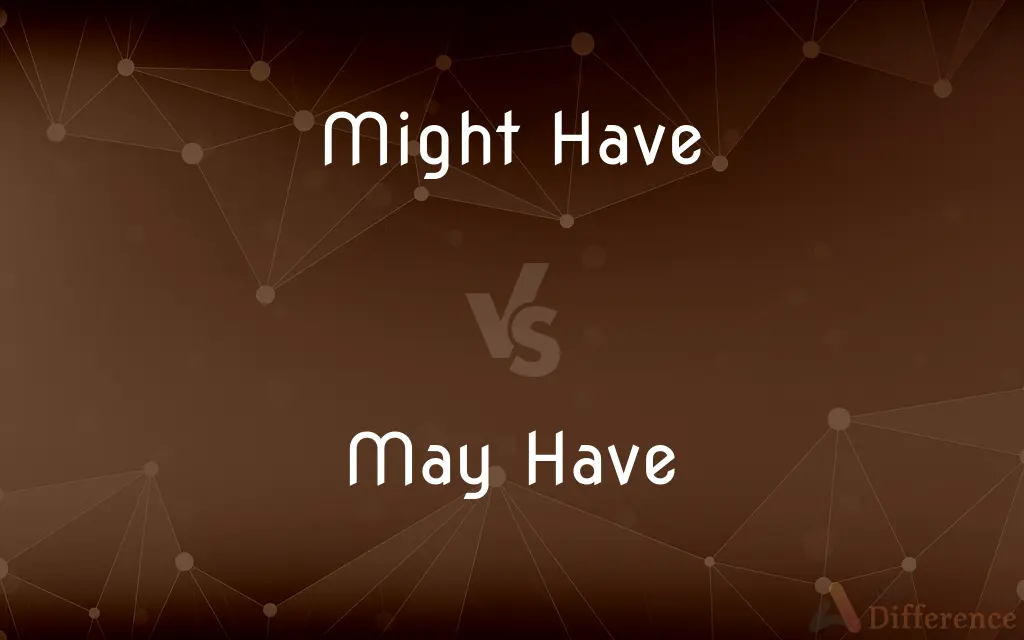Might Have vs. May Have — What's the Difference?
By Tayyaba Rehman — Published on January 18, 2024
"Might have" expresses a lower probability or more speculative past possibility, while "may have" indicates a higher likelihood or permission in the past.

Difference Between Might Have and May Have
Table of Contents
ADVERTISEMENT
Key Differences
"Might have" is typically used to express a speculative or uncertain action that could have occurred in the past. It often conveys a sense of doubt or a lower degree of probability. On the other hand, "may have" is used to suggest a higher likelihood of a past action or event occurring. It indicates a possibility that is considered more plausible than "might have."
In terms of nuance, "might have" often implies a more hypothetical or imagined scenario. For instance, when reflecting on a missed opportunity, one might say, "I might have won if I had participated." Conversely, "may have" is used when the speaker believes there is a reasonable chance that something occurred. For example, "She may have left early, given the traffic."
"Might have" is also used to express a polite or tentative suggestion about a past event, softening the statement. In contrast, "may have" can be used to imply permission or allowance in the past, although this usage is less common in modern English.
In literary or formal contexts, "might have" can convey a more reserved or cautious tone about past events or actions. "May have," while also formal, often suggests a more assertive stance about the likelihood of past occurrences.
Both "might have" and "may have" are modal verb phrases, but their usage depends on the speaker's perspective on the certainty or likelihood of the past event. The choice between them can subtly change the meaning conveyed in a sentence.
ADVERTISEMENT
Comparison Chart
Degree of Probability
Lower, more speculative
Higher, more plausible
Usage Context
Hypothetical, less certain scenarios
Reasonably possible scenarios
Tone
More tentative and cautious
More assertive about likelihood
Implication
Often implies speculation or missed opportunities
Suggests a reasonable chance or past permission
Example Sentence
"He might have missed the train due to the delay."
"She may have already finished the report."
Compare with Definitions
Might Have
Missed opportunity
We might have won the game with better preparation.
May Have
Assertive speculation
They may have already reached their destination.
Might Have
Less certain past action
They might have taken the wrong turn.
May Have
Reasonable past possibility
She may have left the document on her desk.
Might Have
Speculative possibility
He might have forgotten the meeting.
May Have
Past permission
He may have entered the room, as he had the key.
Might Have
Tentative suggestion
You might have seen her at the concert.
May Have
Plausible explanation
The error may have occurred during data entry.
Might Have
Hypothetical scenario
I might have become a doctor if I had studied medicine.
May Have
Higher likelihood scenario
The train may have been delayed by the storm.
Common Curiosities
Can "may have" suggest a higher probability?
Yes, it often implies a more plausible scenario.
Is "might have" softer or more polite than "may have"?
Often, as it's less assertive about past events.
Are both phrases used for past actions?
Yes, they refer to possibilities or actions in the past.
Are both phrases grammatically similar?
Yes, they're both modal verb constructions.
Is "might have" less definitive?
Yes, it conveys a lower degree of certainty.
Is "might have" more uncertain than "may have"?
Yes, "might have" often indicates greater uncertainty.
Can "may have" indicate a reasoned assumption?
Yes, it's often used for reasonable speculations.
Can "may have" be used for guesswork?
Yes, especially for educated guesses about the past.
Can "may have" imply permission?
Yes, but this usage is less common today.
Is "might have" appropriate for formal writing?
Yes, it's suitable for both formal and informal contexts.
Is "might have" used for hypothetical situations?
Yes, especially for less likely hypotheticals.
Is "might have" suitable for expressing regrets?
Yes, it's often used in the context of missed opportunities.
Do "might have" and "may have" differ in all English dialects?
The difference is generally recognized across English dialects.
Can "may have" express a past action that's just come to light?
Yes, it's used when a past action is recently considered or discovered.
Can "may have" refer to missed actions?
It can, but it usually suggests the action likely occurred.
Share Your Discovery

Previous Comparison
Short Term Memory vs. Long Term MemoryAuthor Spotlight
Written by
Tayyaba RehmanTayyaba Rehman is a distinguished writer, currently serving as a primary contributor to askdifference.com. As a researcher in semantics and etymology, Tayyaba's passion for the complexity of languages and their distinctions has found a perfect home on the platform. Tayyaba delves into the intricacies of language, distinguishing between commonly confused words and phrases, thereby providing clarity for readers worldwide.













































